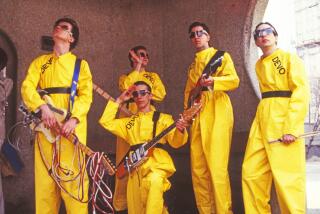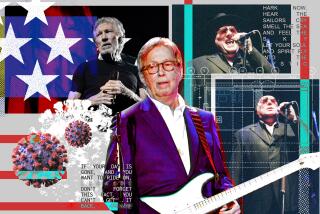Metal is growing up, speaking out
- Share via
SAN FRANCISCO — Heavy metal singer Chris Barnes didn’t know what people would think of the antiwar song “Amerika the Brutal” he wrote after his cousin deployed to Iraq in 2003.
He heard a number of complaints -- but also received supportive e-mails from American troops in the war zone.
“It kind of sent a shiver up my spine because those are the guys I didn’t want to offend by sounding antiwar,” said Barnes, vocalist for the death metal band Six Feet Under.
Other metal bands are finding similar inspiration.
Lamb of God’s albums criticize American foreign policy. Cattle Decapitation are ardent vegetarians who use explicit album covers and songs like “Veal and the Cult of Torture” to condemn the meat industry. Serj Tankian of System of a Down is co-founder of a nonprofit organization that works on social issues.
More than three decades after Black Sabbath conjured images of the dark arts, heavy metal is growing up. The genre is increasingly incorporating social and political messages into its dense power chords.
Cattle Decapitation vocalist Travis Ryan said his San Diego band’s mix of charging guitars and an animal rights message is drawing a diverse crowd that includes activists as well as traditional metal fans.
“We’ve always had a lot of crazy crossover going on,” he says before a recent show at Pound SF, a club in an industrial section of San Francisco. “It’s a pretty diverse crowd we have. I’ve never known what to make of it.”
Twenty artists recently displayed art inspired by the band’s last album, “Humanure,” in an online exhibit. Proceeds from sales of the art will be donated to animal rights causes.
Metal bands are also branching out into literature and mythology. Mastodon, headlining a summer tour with metal stalwart Slayer, patterned the concept album “Leviathan” around the story of Moby Dick. Death metal band Nile bases its songs and image around Egyptian mythology and iconography.
“Metal is expanding and evolving and becoming more diverse,” said Canadian anthropologist and filmmaker Sam Dunn, who directed “Metal: A Headbanger’s Journey,” released on DVD this summer. “It’s at a much more vibrant state than it was even five or 10 years ago.”
Heavy metal has always touched on social and political issues. Metal grandfathers Black Sabbath criticized the Vietnam War in songs such as “War Pigs” and “Children of the Grave.” Iron Maiden’s “Run to the Hills” was an angry denunciation of the displacement of Native Americans.
But much of the criticism was blunted by dark imagery that panicked parents and led to the now ubiquitous “Parental Advisory” labels. Metal’s punk brethren were seen as having a more learned world view.
That began to change when hard-core punk and metal fused in the late 1980s with bands such as Dirty Rotten Imbeciles and Nuclear Assault.
Metal artists “have responded to the culture and politics of the day,” said Donna Gaines, a sociologist and author of “Teenage Wasteland,” a study of working class New Jersey metal heads.
“This is another generation rising,” she said.
More to Read
The biggest entertainment stories
Get our big stories about Hollywood, film, television, music, arts, culture and more right in your inbox as soon as they publish.
You may occasionally receive promotional content from the Los Angeles Times.










